#but i'm contemplating it
Explore tagged Tumblr posts
Text
Still turning Wicked around in my head.
Rotating it in the tumbler.
Debating writing something with it but like. Not quite there.
There's a couple of moments that scream to me.
Not sure my grasp of the characters is strong enough and like it....
It's Wicked, with its huge fandom, and it's....
I want to make sure I have the grasp on the characters I want before getting into it.
#musings#bandit#bandit brainstorms#wicked as a fandom in terms of posting is not as intimidating as posting in danganronpa was#the first time with oh worm and again when i started posting oaei#wicked isn't intimidating but like#i feel like there is a very set way people expect the characters to be written#with regards to the musical#(i don't think i'm expected to have read the book which is nice)#but i'm contemplating it#alongside#scapegoat fic#because junko in scapegoat is glinda#and i think junko pre-tragedy in terms of how she portrays herself will probably take from glinda#if she hasn't already been#i think they have a LOT alike#glinda's an airhead and petty and she is THAT GIRL#but she's also...smarter than she lets on i think#she's crafted a persona that makes her popular because life is a popularity contest#and if you can charm the shit out of people they'll do what you want#and she can pull it off#glinda is INCREDIBLY smart when it comes to CONTROLLING PEOPLE#and elphie just reached and said 'here i'm going to give you a heart and now you're going to have to live with that'#glinda is tempered by elphaba#WILLINGLY tempered - that's the point of the dance scene#glinda couldn't manipulate or bitch or petty elphaba into helping her#elphaba helped because glinda literally did 1 nice thing for her and her sister#and glinda didn't even mean to be nice!#and she could have continued to use that to her advantage and she DIDN'T#she CHOSE not to
4 notes
·
View notes
Text


Parker’s failed dramatic entrance (part 44)
#parker: why am I contemplating my mortality I'm already dead#sorry parker arthurs just built different#malevolent#malevolent podcast#malevolent spoilers#malevolent fanart#parker yang#i wanted to try a full page comic style this time#it was so fun!!!#also he is doing the dreamworks face in panel 2 lmfao#my art
2K notes
·
View notes
Text
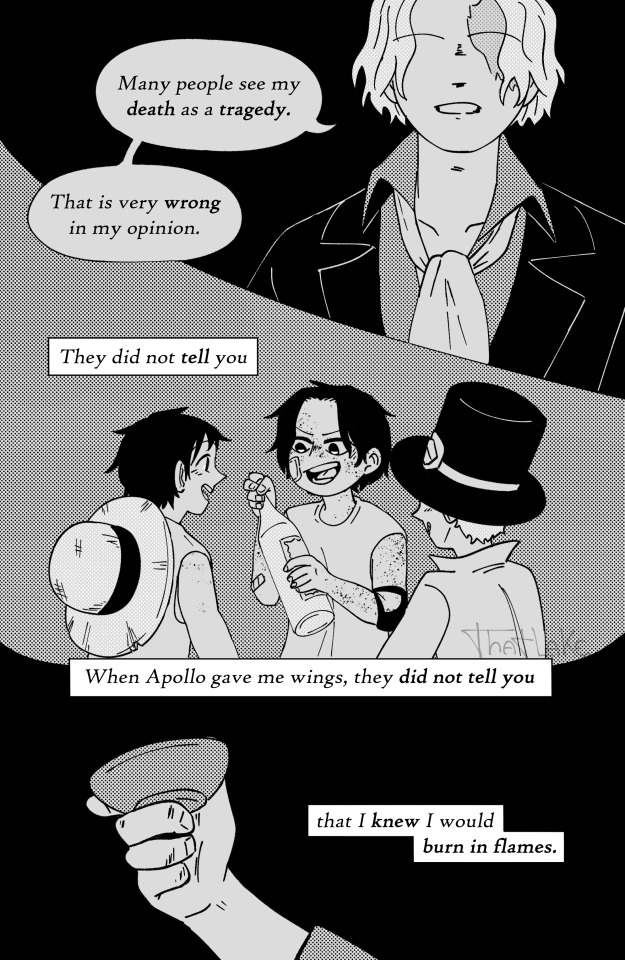



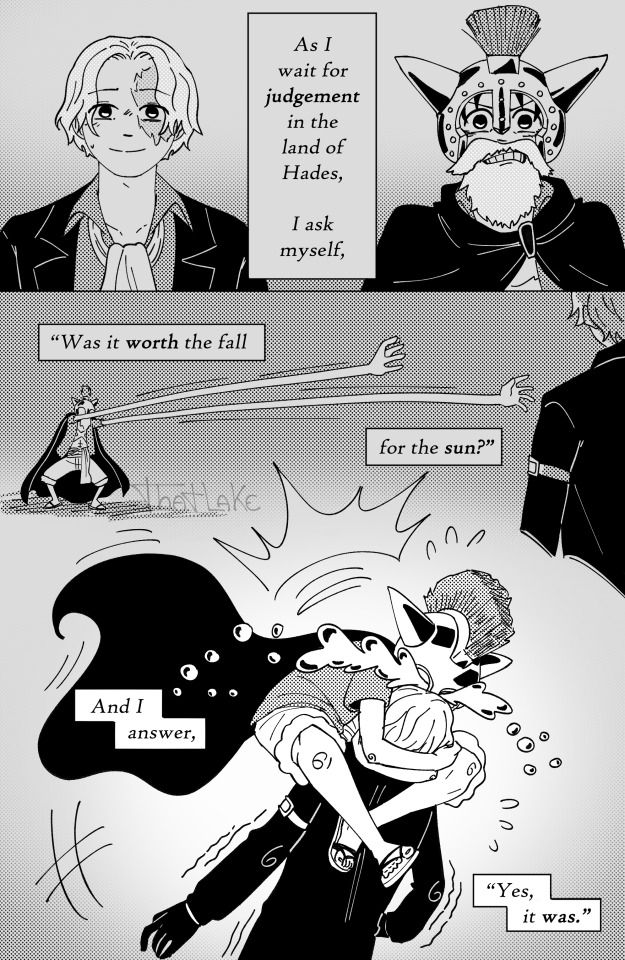
“Icarus.”
it's all about freedom really
Credit goes to An Sifakah for the poem. Enjoy!
Support me on Ko-fi maybe?
#lake's art#happy birthday sabo!#this time actually on time wow#revolutionary sabo#one piece sabo#asl brothers#asl trio#monkey d. luffy#portgas d ace#watch me tag ace even though he barely shows up#one piece comic#one piece#one piece fanart#oh i'll confess. i traced that ship from a screencap#there's no force on earth that can make me draw a whole ass ship sorry#as always I am stupidly proud of exactly 1 (one) page and this time it's the third#but i also just love that part of the poem so i was already biased towards it before i drew it lmao#i had a whole ass explanation for the reasoning behind this comic that i wrote at like. 3 am. but fuck knows what i did with it#i contemplated colors and immediately gave up. hell nah i'm not doing that again
4K notes
·
View notes
Text
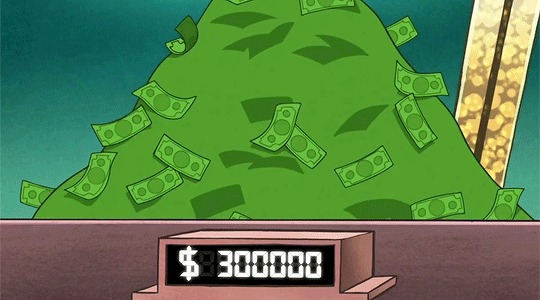








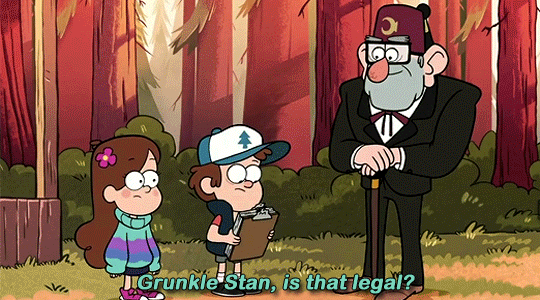
Stan Pines + quotes
Ford | Mabel | Dipper
#stan pines#stanley pines#alex hirsch#gravity falls#my gifs#my edit#contemplating making a ford one but i may need suggestions i'm blanking so bad on him#oh maybe the one about giving weapons to children#i know he's SO unhinged too i'd just need to rewatch his eps
1K notes
·
View notes
Text
sad: falling out of a hyperfixation
tragic: watching your beloved friends and mutuals fall out of the hyperfixation while you're still in it
#oughhhhhhh#this is about the dca fandom but also about every other strong fixation ive had over the years lol#i know it's normal and inevitable esp for less popular works or minor characters with little canon content#and there's nothing wrong with smaller communities of course those rock#but there’s just something special about getting into something at the same time as a lot of other people all at once#and existing in this chaotic fandom space that's just bursting with creativity and passion#i've been in fandom spaces for as long as some of you have been alive and i've only come across that sort of unbridled joy like#a handful of times at best#it's just a heartbreaking feeling to see real lightning in a jar fandoms like that wither away as people drift away#(understandably so!)#anyway don't mind me i'm just having thoughts#musing about fandoms past as well#that i too eventually moved on from but remember fondly even if im not active in anymore#also my music just aint hitting right so im just sitting in silence which makes me more Contemplative(tm)
8K notes
·
View notes
Text

Missed drawing these two too
Bonuses
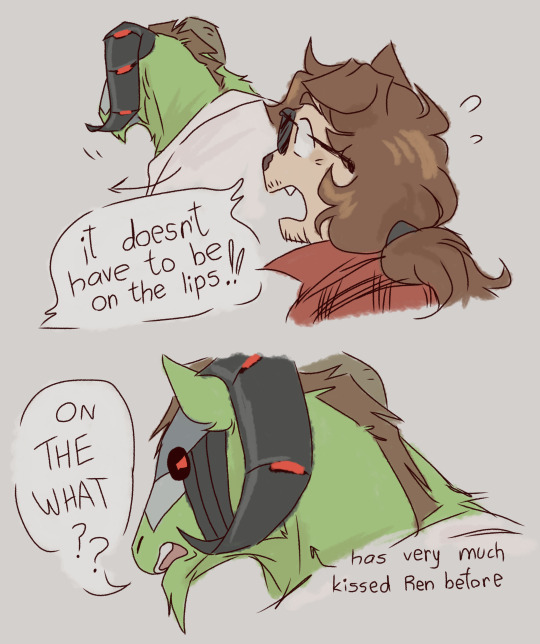
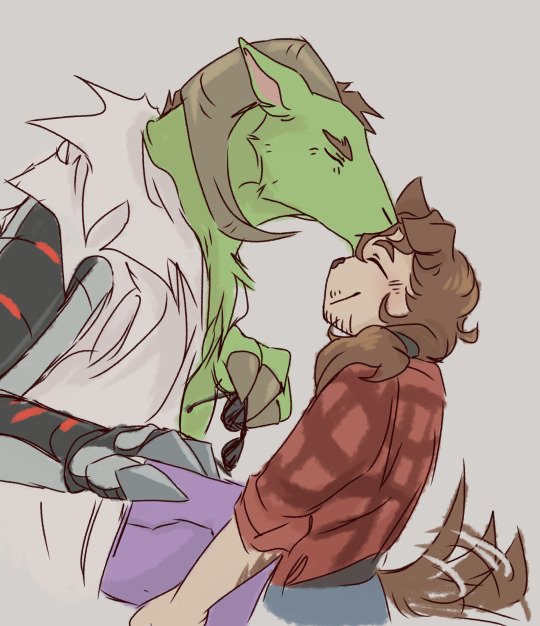
#rendoc#still thinking about them a lot#always#hermitshipping#sorry for the weird empty area in the first one. It was my attempt to make it take up less of people's timelines#this art is so embarrassing lol but man I like when Doc's drawn as a big goat man I have no defense I plead the fifth#or well at least it becomes embarrassing when its. shippy#whatever Tumblr people are usually cool so here goes!!#I am 99% a fluff and hurt/comfort person. Idc how frisky these guys get in fanon all I can ever think of is fluff sorry#Also contemplated implementing Doc's accent into the dialogue but I am forever paranoid of offending someone lol#idk how to write accents etc but you guys will make it sound fine in your heads I'm sure#hermitblr#tubby art
2K notes
·
View notes
Text
(The Blood of Arlathan Spoilers)
(Audio of Solas and Elgar'nan bickering in Rook's head. Audio script included.)
Solas: Elgar'nan! Lethallin! Ma banal'evanuris. Ma salin ar ghilana?
Elgar'nan: Fen'Harel! You have no power here!
Elgar'nan: So the Dread Wolf has arrived to defend his pawn.
Solas: Your cruelty forced my hand.
Elgar'nan: A hundred generations, and still the same refrain.
Solas: Again, you have caged our people, and again, I will set them free.
Elgar'nan: But you were always stubborn, Fen'Harel. Insubordinate. Unmanageable, even by Mythal's reckoning.
Solas: You have lost the right to speak her name.
Elgar'nan: Ma vallas ban! Shev gar, Fen'Harel!
Solas: The only reason Mythal joined you was that she knew the monster you would become if left unchecked. She thought to temper your brutish ego. Instead, you betrayed her. Murdered her.
Elgar'nan: (Chuckles) Only the first time, Dread Wolf.
[Elgar'nan talking to Rook]
Elgar'nan: Your struggle is pointless, and your faith in the Dread Wolf is misplaced. Give up. Save yourself. Save your friends.
Solas: The cruelty is nothing new, but what happened to the vaunted brilliant mind of Elgar'nan the mighty? The blight has left you blunt and slow, a monster, not a mastermind. You used to be a challenging opponent.
Elgar'nan: You saw me as an opponent. To me, you were an irritation. A fly buzzing ceaselessly.
Solas: I must speak to you in this tongue. It seems Elven is beyond your grasp.
Elgar'nan: As much as freedom is beyond yours.
Solas: Once the blight is free, it will rule this world, and you will be its attack dog. You will burn this world at its command, as Andruil did at yours, and you will leave only ruin behind you.
Elgar'nan: This world is ruined already! Your Veil destroyed it!
Solas: You could heal it. You have the strength to repair the damage without using the blight!
Elgar'nan: (Choked laughter) Save your games for the mortals, Dread Wolf. The blight is my blade, and it will take more than your tricks to get me to lay it down. Your whining comes from envy, Fen'Harel, but it does not have to be so. There is a place for you at my side in a new, glorious empire.
Solas: But it will not have eluvians, will it? June built them, and now he is dead. Our great cities came from Sylaise. Our deepest mysteries from Dirthamen.
Elgar'nan: I will restore it all. Their achievements will not be lost.
Solas: You were a bully who ruled over what others had built, and now the others are gone. Who do you have left? Ghilan'nain? You cannot rebuild a world by stitching together monsters.
#dragon age#veilguard spoilers#dragon age the veilguard#dragon age 4#solas#dragon age solas#elgarnan#elgar'nan#was contemplated translating the elven but I'm too sick for that lmao#audio files
613 notes
·
View notes
Text
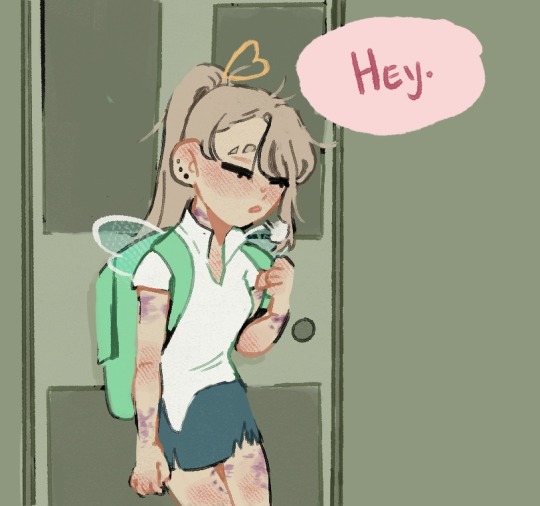
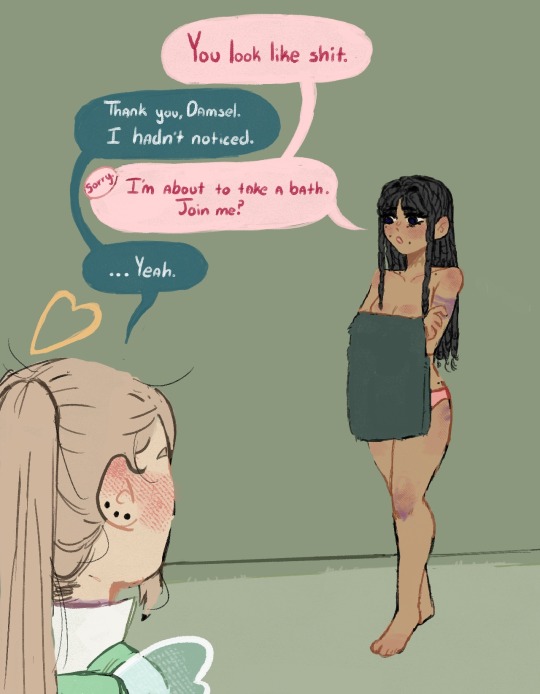

sometimes after a long day of being molested by the whole town all you need is to soak in the bath with your bestie (˶ˆᗜˆ˵)♡
with @wreckowafer 's yunie <3
#what better way to cheer up your bestie than spilling tea as you sit in the bath together and ignore the sting of your bruises <3#yunie and damsel are both severely emotionally stunted but they enjoy each other's presence. cuties ♡#wafer and i did not coordinate bathroom posts btw we literally just have the same braincell 😭#dol pc#damsel the starlet#i wanted to draw the girlies a bit bruised up since i haven’t drawn Damsel with bruises#which simply would not do#damsel doesn't get harassed as much but she still gets harassed#she's small and not very strong so she relies on her reputation mostly to send people away#and if they won't leave she gives them mind melting head and contemplates killing them off later <3#anyways...on to the other drawings i have in mind 🙏🏽#no nippies so hopefully tumblr won’t snipe me 🙏🏽#forgot Damsel's industrial in that second pic....oh well#ignore how small my handwriting is I'm trying to curb that but i'm failing 😭#tw bruising#tw implied assault#damsel draws sometimes
390 notes
·
View notes
Text
Jayce and the fallacy of the butterfly effect in Arcane's narrative


If Jayce's symbol is the butterfly, then my theory is that we're going into a full "butterfly effect" narrative in Act 2. Either we'll watch it happen, or we'll only see Jayce come out the other side of it changed by the experience, knowing - or more importantly, THINKING he knows - what to do to change the future. Literally, to "defend tomorrow."
tl;dr: Jayce will encounter the butterfly effect in season 2. Viktor and Mel both foreshadowed this in season 1. I think Jayce will fixate on Viktor and will believe that stopping or changing Viktor either in the past or the present - most likely the present - will mean he can save the future. I believe this will lead to an even worse tragedy and may have the same effect as a self-fulfilling prophecy. Ekko's approach to changing the future by sticking closer to the present - considering only tiny increments of time to alter more immediate future outcomes - will be the superior approach. I also think that Jayce attempting to change the future will create the conditions that push Viktor to become the Machine Herald.
One of the most common reactions even the casual viewer had to Arcane season 1 was this: "If [character] had just done this one small thing a little differently, [tragic event] wouldn't have happened!"
Arcane has been called a Greek tragedy for the main reason that because of how well built up the characters' personalities and reasonings are, there's no other way season 1 could have gone. There was no stopping the multiple tragedies that occurred, because with one event leading to another, the chain of seemingly inevitable events goes too far back to identify what one singular event caused everything, what one character made what one decision to put our characters on the terrible paths they walked.
Arcane is about to investigate this idea in its own narrative, and I think that Jayce will be the character to stumble into the flawed idea that you can change one event, or stop one character, and change the future for the better. This is because Jayce struggles with a few very interesting character flaws, one of them being that he believes himself to be the main character, and it is therefore his responsibility to intervene, be a hero, and fix things.
Viktor and Mel both foreshadow Jayce's future encounter with the butterfly effect.

Recall that Viktor said: "There is always a choice."
Jayce sees choices in black and white, believes that he has no other options but to go along with what he's persuaded and pushed into, and acts too boldly with too much power multiple times.

Recall that Mel said: "We can't change what fate has in store for us, but we don't have to face it alone."
Jayce tries to solve big problems on his own, and though he delegates to Enforcers and the like, Jayce relies on his reasoning and his alone to make important decisions if he doesn't simply become persuaded - usually through strong emotions like fear - by other characters. In addition, since Mel is specifically talking about Viktor's plight here, it's worth mentioning that while Jayce did say that he would help Viktor in acts 2 and 3 of season 1, Jayce does wind up leaving Viktor to face his fate alone. When Jayce tries to change that fate in s2 ep1, ep2 shows that only tragedy can come of this as well.
Viktor and Mel's statements here are not contradictory. Viktor makes the point that you can always make a choice. In context, he's literally referring to the classic "secret third option," because given a choice between aggression and passivity, war and surrender, Viktor chooses to defuse the bomb instead. Mel, interestingly, seems to believe that destiny is fixed in a broad sense, and she operates as a politician and diplomat and investor who navigates that line of destiny in the most optimal way possible. In reality, in context, she is referring to the fact that Viktor can't change the way he was born and so he has no way to change his fate and therefore must face it, which is true - she's only missing the information that Viktor actually does have the means to change his illness and his body. Her wisdom still applies however, because he'll have to accept the hand that fate deals him after he makes that choice. Will he face it alone, or not?
There is always a choice, there's even secret third options, because having a fate doesn't mean that you are doomed to make only one possible series of choices. What it does mean is that each choice comes with a hand that fate deals you. It is impossible to know what all of these branching choices and consequences are in advance, and it is just as impossible in hindsight - the branches are too complex and the end outcomes are all equally meaningful, just different. If Arcane season 2 is to be a tragedy, it may show us that each possible outcome is still tragic if you fall for the fallacy of the butterfly effect.
Jayce is counseled by some of the wisest, cleverest characters with the deepest life experiences in Arcane, but he hardly ever takes that counsel to heart. If he does, he still acts on that counsel in flawed ways that have unintended consequences. This will come to a head in season 2.


Viktor and Jayce both have a butterfly following them around in season 1. The butterfly effect refers to one small seemingly insignificant event changing the course of history, and changing that event therefore changes history. Viktor bled over the railing of a Hexgate in season 1:

And Heimerdinger sees what we can only assume is Viktor's blood contaminating (?) the Hexgate in s2 ep3:

This might be the seemingly unimportant "inciting incident" that Jayce (and Heimerdinger and Ekko) settle on as something that should be avoided or erased by changing the past (if they time-travel with Ekko, for example).
I doubt that, if this is what this crew chooses to fixate on, it will be the only event that is considered as something to change. But let's take this and run with it for the sake of discussion.
As silly as it sounds, how do you stop Viktor from allowing his blood to come into contact with the arcane? Stop Viktor's involvement with the Academy entirely? Don't invent Hextech at all? But what if someone else invents Hextech besides Jayce? What if future tragedy befalls Piltover because it didn't invent Hextech?
The possibilities and what-ifs could branch on forever. But because Jayce is who he is, and because his tragedy with Viktor is still raw and recent and frightening, I think Jayce's butterfly effect experience will have to do with Viktor.
My personal prediction is that the timeskip between s2 ep3 and ep4 will be Jayce experiencing a timeline where Viktor, taken over by the Hexcore, brings about an apocalyptic event similar to what Heimerdinger experienced in his past. Either Jayce and co. can't go into the past to change the present, or Heimerdinger and/or Ekko advise strongly against it to avoid a paradox. This will lead to them re-entering the canon Arcane timeline before this apocalypse, but still after the timeskip. Jayce, believing that destroying Viktor and his cult will save the future, and believing that resurrecting Viktor was Jayce's mistake to fix, attacks him. But the consequences don't unfold the way he hopes, because trying to change fate once the cards have already been dealt has led to tragedy before.

The butterfly is a symbol of something other than just the butterfly effect - change, evolution, and rebirth. If the butterfly symbolizes the butterfly effect for Jayce, then I think it has a different meaning for Viktor - the change and rebirth meaning.
I've always found it very interesting that we see a similar-looking butterfly on Progress Day... but made of metal.

Every time Viktor's situation changes, he adapts and evolves. If Jayce attacks him, if his cult is destroyed, if the Hexcore is causing Viktor to decay, if all of these things happen at once - he'll just evolve again, and I think the Machine Herald is the next step. And the Machine Herald will be a triumph for Viktor, but Jayce will believe that he's created something even worse. The resulting feud will be a personal nightmare for both of them.
I think this still allows Viktor to use his own agency to choose to become the Machine Herald (the MH will probably be the "secret third option" that saves Viktor, or there will be a secret third option that ends the feud) while still allowing Jayce to be offended and horrified at whatever the Machine Herald represents or is trying to do in the undercity. Introducing the element of time travel allows Arcane to explore the meta concept of tragedy and fate that season 1 was built on while showing that you can't "solve" a tragedy, because there are other terrible possibilities lurking behind alternate choices. Especially if what you're trying to change is singular people or events and not systems of power.

This is why Ekko's approach with his Z-drive will be superior to Jayce's sweeping attempt at changing the future. Ekko's goal has always been societal change. He creates his own punk society in the undercity, more progressive and successful than anything Vander or Silco ever created, and a better bastion of safety, hope, and progress than what Heimerdinger founded in Piltover. Trying to change systems by going back in time is most likely futile. But taking what Ekko has already built in the Firelights, curing his tree, and fighting for the Firelights' survival bit by bit by optimizing the present with the Z-drive shows that:
It's more worth it to focus on becoming wise (Ekko's mask is an owl) and making choices you won't regret
It's best if you don't face your fate alone (act as a collective and take care of each other)
Consider every option, not just the obvious black and white choices
Maintain and fix what you've already built instead of abandoning it once things get difficult
Adapt as needed if the choices you made lead to dark consequences, and once again, stick together and take care of each other when the bad times do come
That's my Act 2 but, ultimately, my season 2 prediction based on the butterfly symbolism we've already seen. Ekko's involvement is what will give the series the at least partial happy ending that the creators have referred to. I personally don't think that the Viktor/Jayce feud will end quite so well, but maybe, they will still survive.
#arcane#spoilers#arcane s2#arcane spoilers#jayce talis#ekko#viktor#viktor arcane#long post#meta#jayvik#arcane meta#heimerdinger#I'm positive that Mel will be deeply involved with this too considering her comments on fate#honestly the thought of her being caught in the Viktor/Jayce feud is terrible to contemplate so I'm just gonna pray for my girl#I did not like the time travel implications when i first watched act 1 but after thinking about this i feel way better about it#Another reason I think this will come down to Viktor is because Heimerdinger has distrusted Viktor since season 1 and he will focus on him#Ekko will see the faults in focusing on one person#Jayce is least likely to survive all this considering how fast the consequences of his actions are catching up with him#but there could also be a chance here of viktor choosing to spare him - if only to curse him with the Defender/Herald feud forever idk#anyway i am feral for season 2 so far can't you tell
982 notes
·
View notes
Text
Where is the line?
In the comics, Tim Drake's moral code is an enigma to me, particularly his stance on the Batclan's no-kill rule. For all the fans who say he's always one step away from full blown villainy, there are even more saying he's a strict goody two-shoes who could never stoop that low.
Then there's the different takes on where Tim draws the line between these two extremes. Personally, I find that line hard to pinpoint. Digging for canon demonstrations of his morals has lead me to more questions than answers. My biggest question right now is:
What counts as breaking the no-kill rule in Tim's eyes?
Luckily, the Robins 2021 comics shed some light on this. In issue #3, "Tim", or rather an imposter of him, said that choosing not to save someone isn't the same as killing them, and that letting a villain die can be a way to get justice. Normally, this point would be moot since it's not Tim himself who said it. However, at the end of issue #6, the real Tim clarified that what the imposter said WAS his real opinion on the matter.
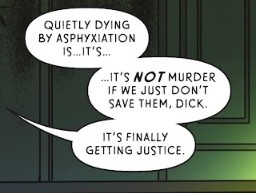
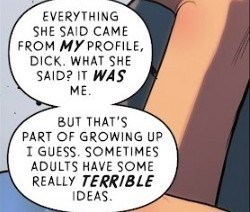
Not only that, but Tim has shown this belief through his thoughts and actions before. Twice.
The first time goes all the way back to Robin 1991 #5. During the fight against King Snake, Tim kicked him through a nearby window, fifty stories above the ground. As King Snake's life hung in the balance, Shiva appeared and commanded Tim to kill him.
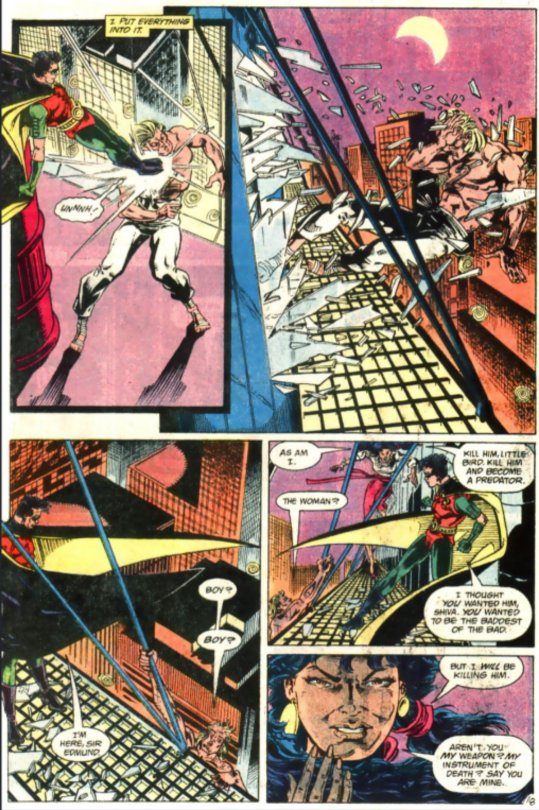
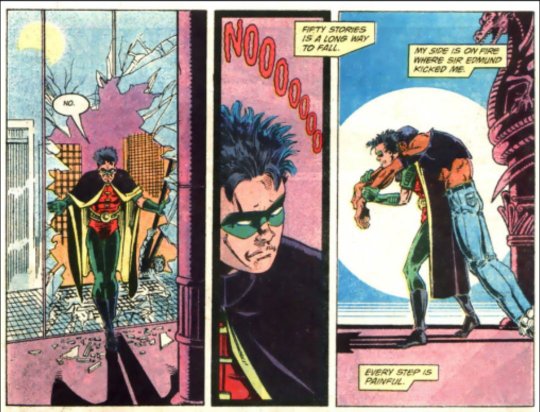
Tim refused. He walked away, leaving King Snake entirely at Shiva's mercy.
What gets me is that Tim made no move to save King Snake from falling. And he made no effort to stop Shiva from committing the murder, either. His only thought as he heard the man's scream was "Fifty stories is a long way to fall."
The second time was in Red Robin 2009 #26. Tim orchestrated a whole plan to manipulate Captain Boomerang into getting killed by Mr. Freeze. The whole time, Tim blamed Captain Boomerang for making all those bad choices, despite Tim being the one raising the chances of them being made. Tim believed he was innocent because he wasn't directly participating.
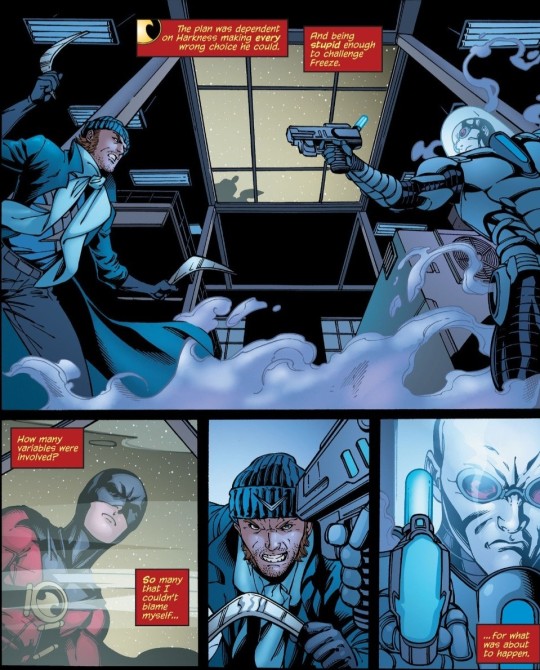
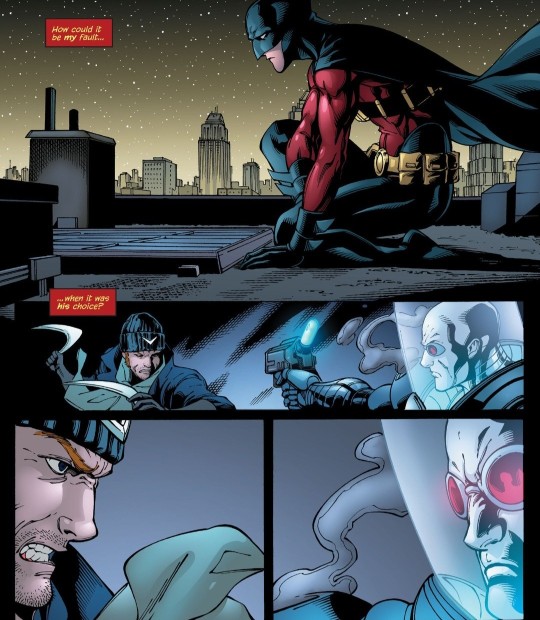
Tim then stopped that plan, but not for any noble reason. He decided that he couldn't let anyone else kill Captain Boomerang but himself.
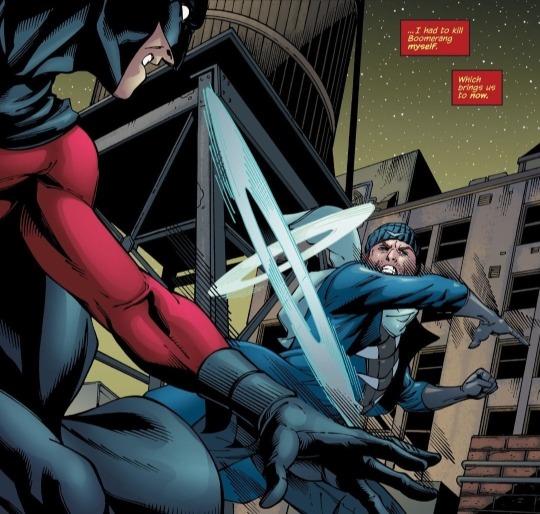
Tim couldn't bring himself to do that, either. So he had to spare his father's killer in the end.
This seems pretty cut and dry so far, right? Tim believing that letting villains die is alright as long he doesn't do the deed himself? I'd think so too, if there weren't other moments contradicting this.
In Robin #35, Steph insisted on leaving an enemy who got buried under the snow to die. Tim chastised her for it.
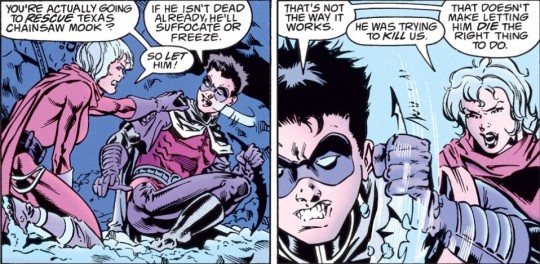
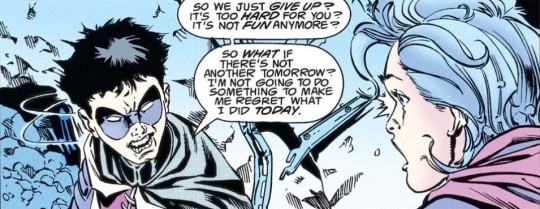
Neither of them were responsible for the snow, or for the enemy getting trapped in it. Plus, that guy tried to kill them with a chainsaw moments prior, so he's not exactly an innocent damsel in distress.
Maybe it was because this enemy wasn't a big enough fish to fry. We didn't really get confirmation that this guy has actually killed before, and he's around goon status at best.
But then in Robin #46, Tim chose to save another enemy who got himself into a deadly situation. That enemy was a murderer known as Young El. This time, Tim wasn't telling anyone else why they should save a murderer's life out loud. These were his private thoughts.
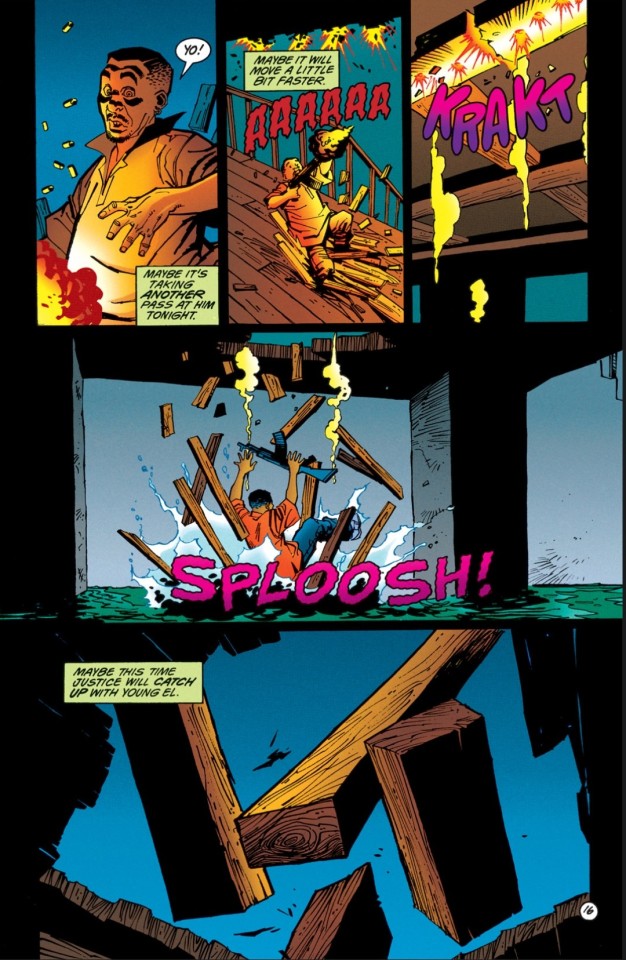
Notice how Tim's inner monologue sounded kind of on-the-fence. He contemplated justice finally catching up with Young El as the floorboards gave way, bringing a support beam down on him in the process.
However, Tim immediately switched gears to rescue Young El from under that beam before the water rose too high.
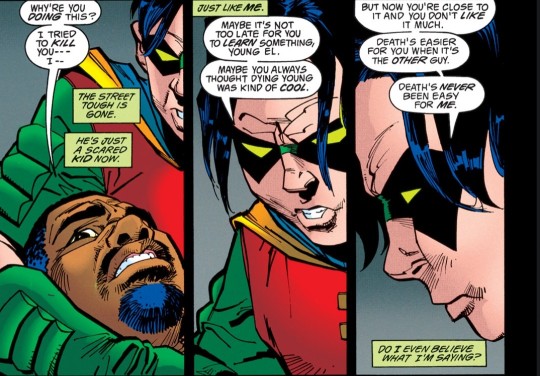
But Tim, as he told Young El the reasons he's saving him, asked himself "Do I even believe what I'm saying?" He could be asking this about two different things he said here. A) "Maybe it's not too late for you to learn something, Young El.", or B) "Death's easier for you when it's the other guy. Death's never been easy for me."
For Tim to doubt his belief in either of these statements is very interesting. He could be questioning if Young El is already too far gone for redemption, or he could be questioning if seeing someone die has never been easy for himself. For all we know, it could be both.
Unfortunately, Tim never got to see if his choice to save him would pay off. Tim wasn't strong enough to lift that beam, and Young El drowned.
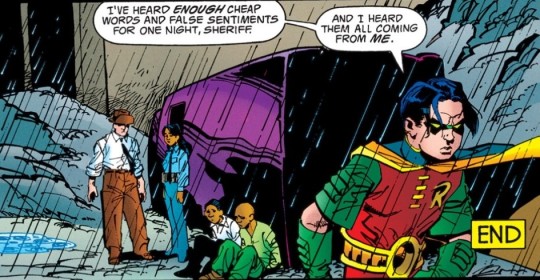
There's a question on my mind as I read these pages. What makes this murderer's death different from when Tim let King Snake fall to his "death"? Sure, King Snake didn't actually die, but Tim didn't know that until later when the man came looking for revenge in Gotham.
Tim was once able to simply walk away from what he was certain would be a killer's demise. But then he's consumed by guilt over not being able to prevent a different killer's death down the line, to the point of hallucinating.

On top of that, what changed Tim's mind later? Red Robin #26 and Robins 2021 #3-6 still happened in the future. The only significant difference I can tell is that these two comics involved the killer's of Tim's parents, making it personal. But if the Imposter from Robins 2021 got his beliefs from his profile before his mother's killer got involved, then does that still hold up?
Maybe we should put a pin on it for now. There are other things Tim's done that brings the details of his no-kill rule into question.
Such as that one time Tim actually killed someone with his bare hands.
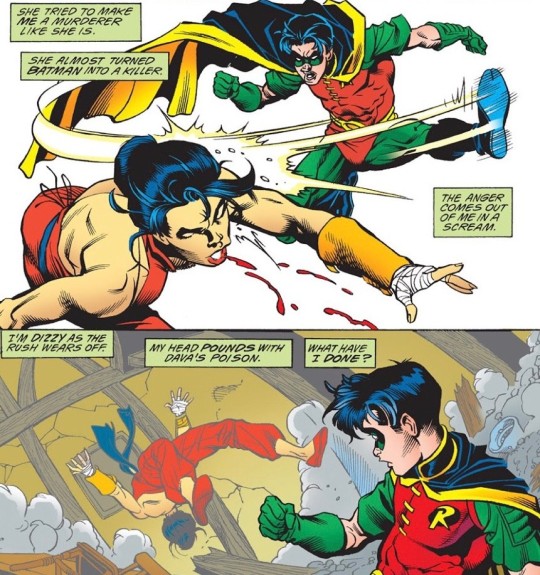
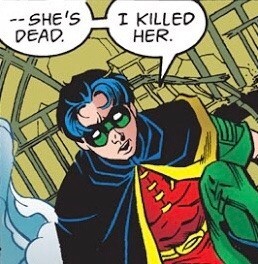
In Robin issues #51-52, Tim accidentally killed Lady Shiva while drugged on amarilla, a plant that enhances the user's speed beyond human limitations.
It may be argued if the amarilla altered Tim's mind enough to excuse him of fault or not. However, I want to focus on what happened after Shiva was revived. Here's another question to go with the first one:
Does Tim believe the kill still counts if the victim was revived afterwards?
From what I've gathered, yes and no. It's kind of complicated.
After Tim killed Shiva, he was understandably distressed about it, about how he can never take it back.
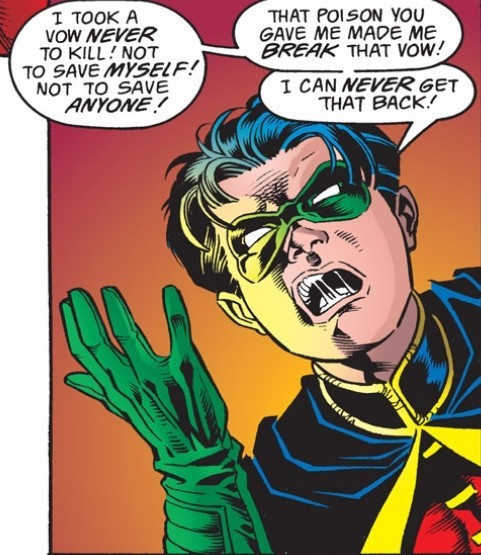
But after Shiva came back to life? Nothing. He didn't dwell on the fact he broke the vow to never kill. For something that devastating to happen in his life, it's odd that Tim didn't bring it up ever again, privately or otherwise. Especially considering what happened later in Robin #123, when Tim thought he killed Johnny Warlock.
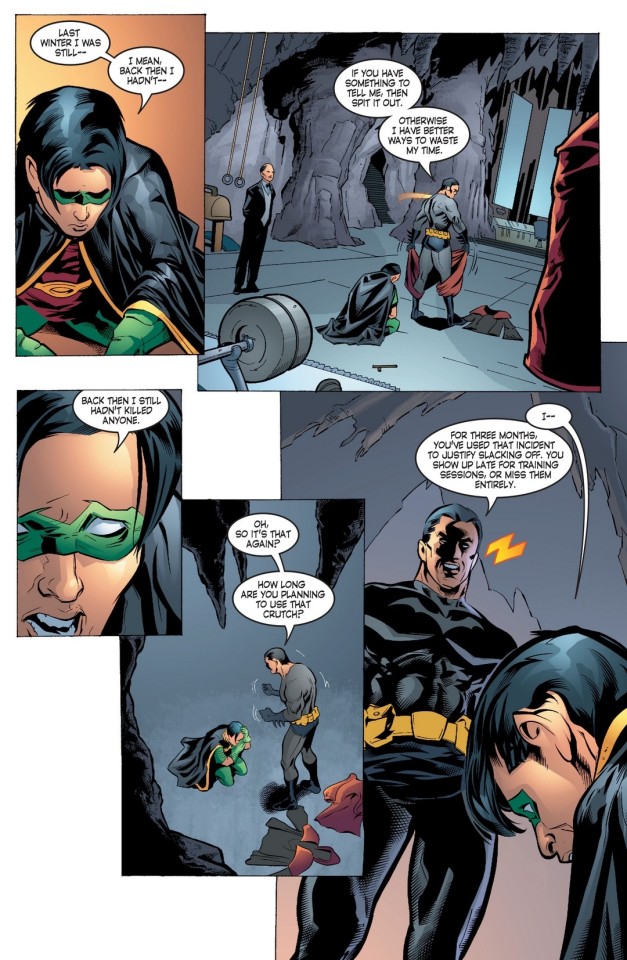
Tim was utterly inconsolable. He lost all faith in his abilities as Robin, and in himself as a whole. It also contributed to his decision to quit being Robin after his dad found out. In general, he seriously dwelled on that "kill" for a much longer time than he had after killing Shiva. The difference being that he knew Shiva was resuscitated immediately afterwards, while Tim didn't know Johnny survived until issue #141.
But there's the fact that Shiva really did die. Her heart and breathing both stopped. So are we to believe Tim moved on from that so easily because she's alive now? What happened to never getting that back?
Come to think of it, not long after Tim killed and revived Shiva, there was someone else who landed in that same boat. Dick.
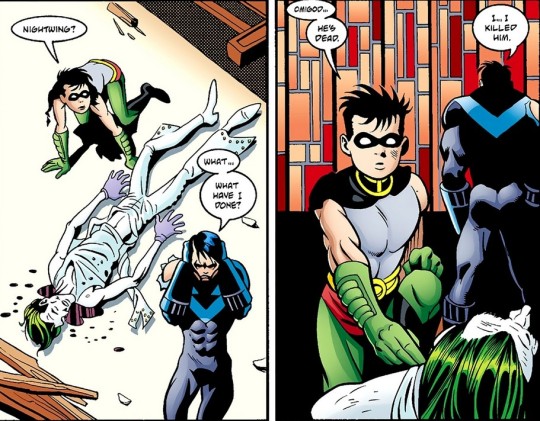
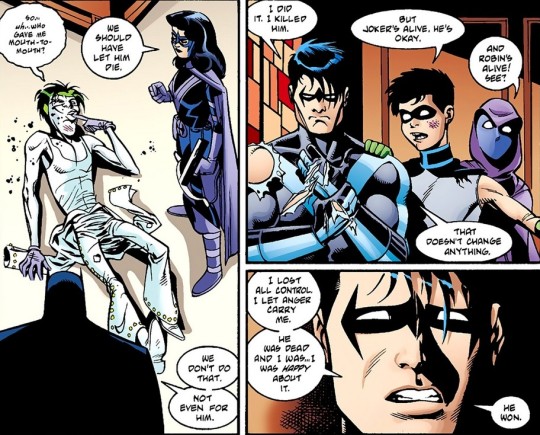
In Joker: The Last Laugh #6, Dick brutally attacked the Joker after believing he killed Tim. Dick ended up accidentally killing Joker instead, before the clown was resuscitated.
Here's the thing. While Tim was trying to comfort Dick, saying that it's ok because Joker's alive now, Dick didn't believe so. He was still distraught that he killed someone. The fact Joker came back to life afterwards didn't matter to him. To Dick, it still counted. So what does that say about Tim?
Before we move on, there's another person Tim knows who also died and came back from the grave. Jason.
Tim openly acknowledged Jason was killed before coming back, too. Multiple times. For example, when they met up in Red Hood and the Outlaws 2011 #8.
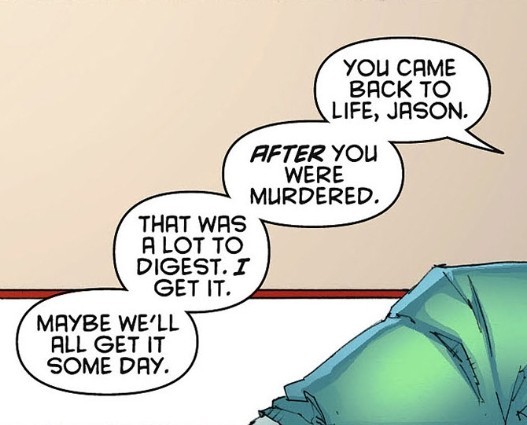
Tim hadn't shown any signs that he thinks Jason's murder doesn't count anywhere, except for maybe once.
In Knight Terrors: Robin #2, Tim and Jason had a heart-to-heart, and Tim said something strange.
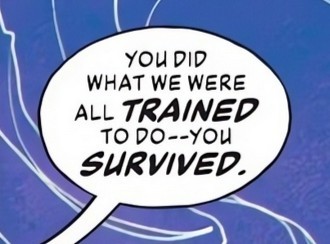
"You survived."
Except Jason didn't survive. He died. To say Jason survived that night would've meant he never died to begin with. Him being alive now doesn't change that. Was this Tim telling a white lie to make Jason feel better? Or does Tim see being revived after death as "surviving"?
Ok, now we can move onto the next question. Or rather, bear with me as we go back to the first question. It's a broad topic with plenty more to talk about.
What does Tim count as breaking the no-kill rule?
We already asked how Tim feels about bringing villains back from the dead after killing them. And we asked how Tim feels about leaving a villain to die without getting directly involved. However, we still don't know how much involvement Tim needs to have in an enemy's death before he'll take responsibility for it.
We can confirm he won't mercy kill in Red Robin #21, even if it means giving someone a fate worse than death. No exceptions.
Tim also doesn't allow anyone he's actively teaming up with to kill, especially if he's the one in command. He's been amicable with known killers before (Huntress and Pru, for example), but only when they remain non-lethal while working alongside him.
Apart from that, though, it becomes less clear. However, I think this is a good place to expand on when Tim blew up a lot of League of Assassins bases in Red Robin #8.
I'm not going into whether or not those explosions actually killed anyone. I've seen evidence supporting both sides of this debate, so I'm just going to say it's up to interpretation. What I AM talking about is whether or not Tim would've felt responsible if they had killed someone.
Before overloading every generator in the LOA database, Tim gave a warning to the Wanderer. He told her that he couldn't be held responsible for what would happen to her if she didn't leave.
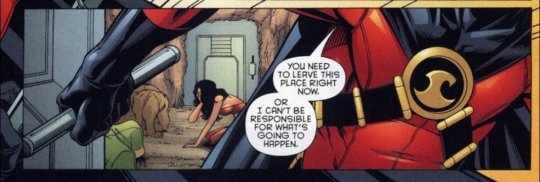
After initiating the explosions, Tim warned the White Ghost that they had fifteen seconds to leave before it was too late.
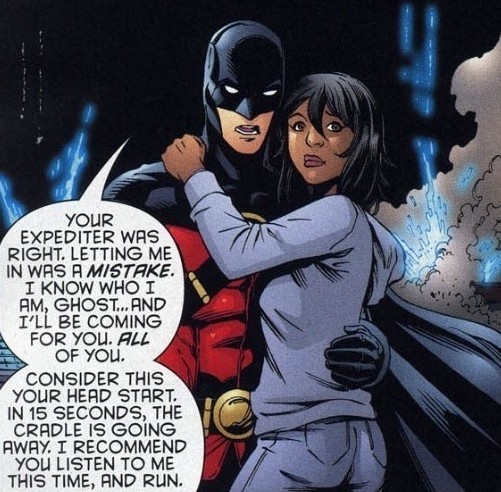
Fifteen seconds. That explanation on the mistake of letting him in might've taken roughly another fifteen to twenty seconds. Did the other bases even get a full minute head start? The way some of the people were already running away could imply they at least got a warning, but it's possible they might not have.
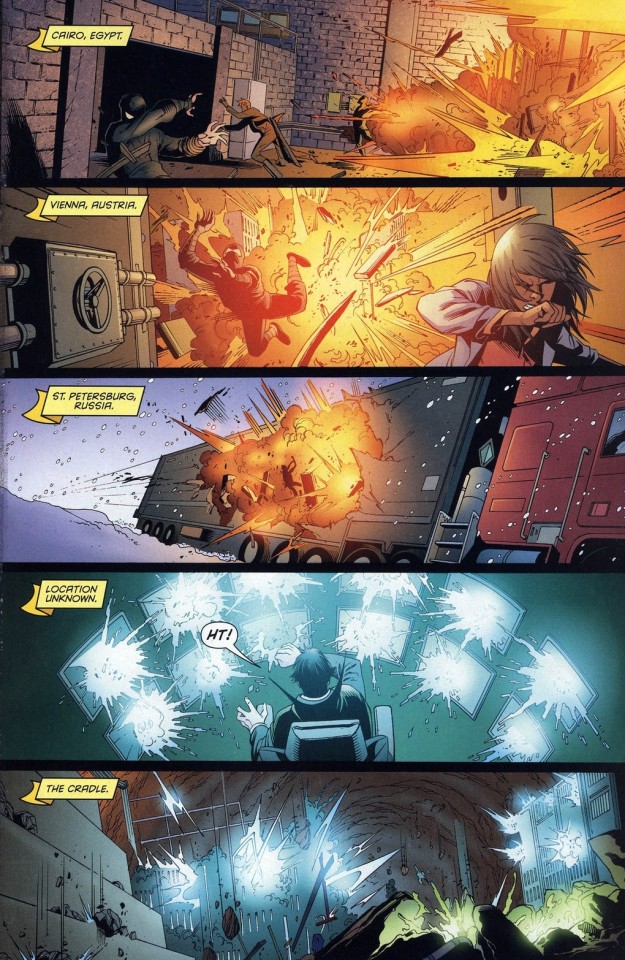
Even if everyone in every base received a warning, would that be enough for Tim to avoid holding himself accountable if they didn't make it out in time? Tim's the one who rigged the bases to explode, but I guess giving someone a warning means it's now their fault for not heeding it?
We can't be sure he even considered the possibility of those explosions killing anyone. Tim knew they were dangerous enough to bring the whole Cradle down, and the other ones we saw looked pretty powerful (except the ones in Ra's hideout). But Tim also called Ra's a murderer right after that happened, which would've been very hypocritical if Tim himself thought he committed murder.
So, my guess is either A) Tim relied on sheer luck for those explosions not causing any casualties and chose to believe they hadn't, or B) Tim didn't believe the deaths of anyone caught in them would be his fault.
Again, this isn't about whether or not blowing up the LOA bases killed anyone. It's about how willing Tim was to take that risk, and if he would've blamed himself for anyone getting killed from it.
Either way, it's canon that Tim had no guilt for the explosions he caused, or for anything he did before Red Robin #22. Just ask the Sword of Sin.
This is an exerpt I got from the Fandom DC Database on the Sword of Sin:
"The Sword of Sin can be ignited with the mind of the wielder, if the person is powerful enough. The sword has the ability to conjure in the mind its victims all of the sins for which they are guilty or have not atoned for."
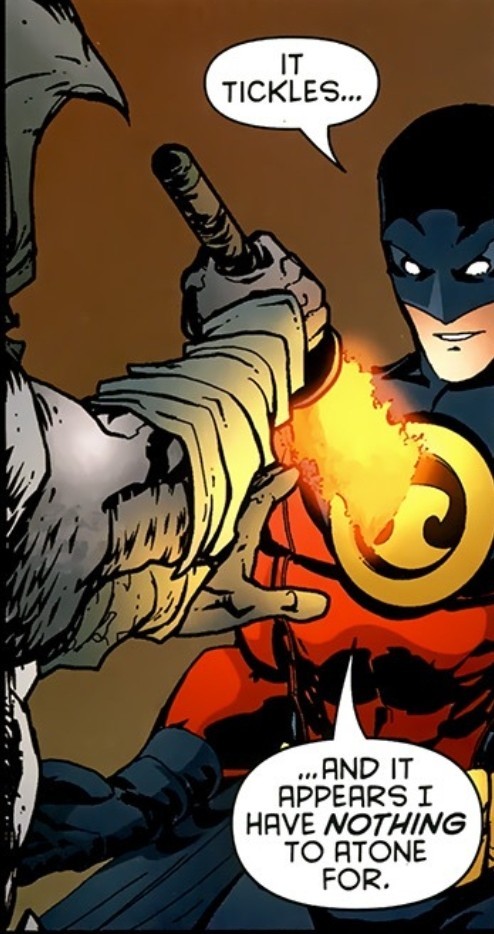
When Tim was stabbed with this sword, he was immune. The Sword of Sin decided he was innocent. Although, I have to ask how reliable this sword was in making that judgement. If the sword is judging others based on its own set principles, then something's not right here.
The Sword of Sin was also used on Dick, and he wasn't immune. It dug into Dicks subconscious and unearthed memories he'd long since repressed. Memories of himself watching a boy get beaten to near death, and then doing nothing. He just walked away.
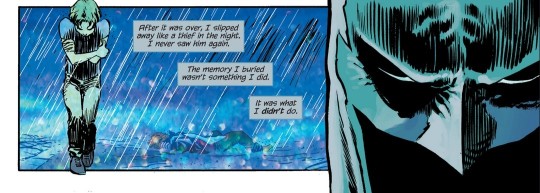
Now, tell me why the sword brought this to light, but not the time Tim left King Snake to die!
It wasn't an accident. Tim deliberately chose to leave instead of trying to save this man from the murderous Lady Shiva. Sure, Tim was no match for Shiva and he might've not been able to stop her, but the same could be said for an eight year old Dick not stopping a group of much older kids. Neither of them tried to stop the attackers.
Tim didn't atone for it, either. When King Snake returned in Batman #469, Bruce told King Snake that it wasn't Tim who left him to die. We know that's a lie, but Tim never corrected this. He let Shiva take all the blame.
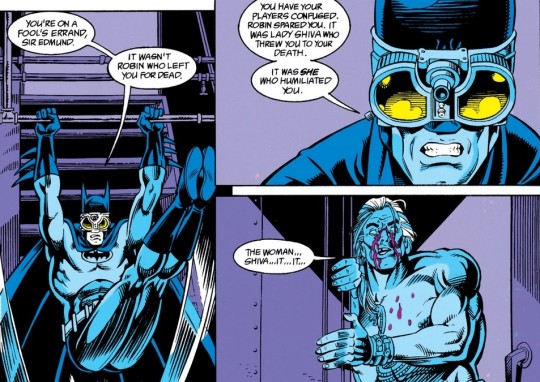
We have two instances of a boy choosing not to prevent someone from having a near death experience. One guilty, and one innocent.
Did the Sword of Sin think Tim was justified because King Snake was corrupt? That doesn't sound holy to me.
Was it because Tim didn't feel any guilt over it, while Dick did? Can the sword's judgement be thrown off by the victim not feeling any shred of guilt over their actions, even subconsciously?
That could make sense given what we know Tim did in the past: King Snake falling, the vandalism (explosions), and ALL the lying over the years (Tim reviving Shiva might count as atonement, so I'm not including that). If the sword based its judgement on God's will alone, then odds are high it would've picked up on one of these.
Even so, I'm not going to sit here and say this is definitely the case. I'm not familiar enough with how the sword effects other characters to make that call.
If this is indeed false, then did the DC universe's version of God decide to pardon Tim of his sins when he prayed earlier that same issue, despite him not believing he had any? I mean, who knows, right?
You can probably see why there's more questions than answers. The point is Tim didn't have any guilt for the things he did before Red Robin #22. Tim was canonically convinced he had nothing to atone for.
So then why did he say the opposite later in Knight Terrors: Robin #2?!
In the heart-to-heart between Tim and Jason, Tim tells him this:
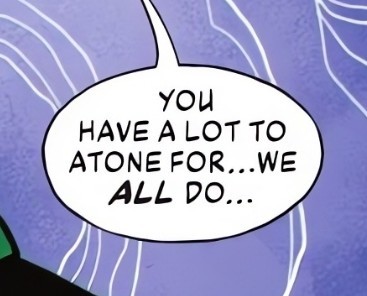
"You have a lot to atone for...We all do..."
Tim knows that the words "we all" include him, right? By saying this, Tim admitted to also having things he needs to atone for, right?
Is this another white lie to make Jason feel better? Is it one of those slight changes the New 52 made to the canon? If not, then why did he change his mind? Did his no-kill rule change and make him feel guilty for some past actions? Is it not the no-kill rule, but something else?
What changed?!
Where does Tim draw the line?
I don't know. We've narrowed it down to a general area, but it's kinda hard to see a line when it's so blurred it could be a gradient.
Tim baffles me. He acts as a steady moral compass for others when he can't even seem to stay consistent with his own. You're free to call it poor writing (and honestly, fair), but I find his hypocrisy fascinating.
That's what it is, isn't it? Tim's a hypocrite who's completely oblivious to being one. And it's not like this was never mentioned in the comics before. Damian called him out on it!
In Batman & Robin 2011 #10, Damian confronted Tim about his near-murderous reaction when Fist Point killed Artemis (Teen Titans Vol 4 annual #1). Damian then accused Tim of constantly rejecting him because they have more in common than Tim's willing to admit.
It's debatable how accurate that accusation was, but Tim had a pretty volatile reaction to it.
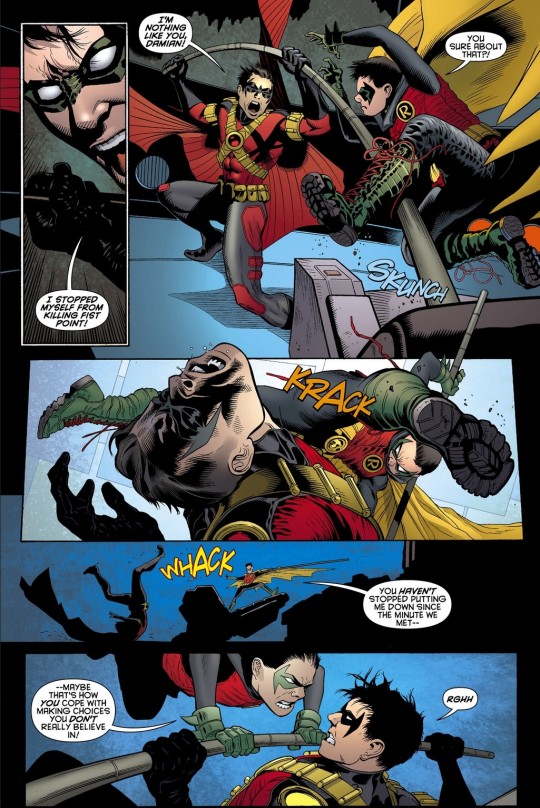
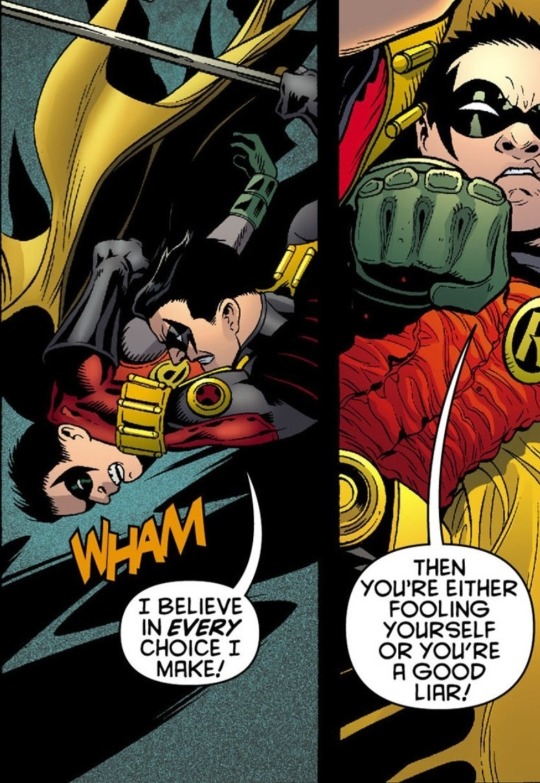
"I believe in every choice I make!"
Does he? I don't think someone who's so sure of what he believes in would contradict himself to this extent. Especially if he wasn't doing it on purpose.
He wouldn't vehemently push Bruce's no-kill rule onto others and berate them for bending that rule, only to go and bend that same rule himself when the Batclan isn't around. He also wouldn't exploit what he thinks are loopholes, decide later that those loopholes broke the no-kill rule, and then earnestly claim he never broke it.
Why is he like this?! He's had arguably the most normal childhood out of the whole Batclan before becoming Robin! What could've made him so fickle about this?!
Where does he draw the line? And how will he know when he's crossed it?
#batman#dc#robin#tim drake#red robin#theory#analysis#long post#tim drake is a menace#unhinged tim drake#To think all of this was written without mentioning Tim's corrupt future selves#or the numerous times he's actually contemplated or attempted murder#Believe me I would've loved to add 5-10 more screenshots of those moments alone#but I hit the 30 image limit :(#Anyway I want to study Tim in a lab#Feedback is welcome#I'm aware I hadn't read all the DC comics so I could've missed something
671 notes
·
View notes
Text




I LOVE YOU, I'M SORRY The Secret of Us Tour — New York City, New York (Night 3) | October 14, 2024
#gracie abrams#gabramsedit#gracieabramsedit#the secret of us#the secret of us tour#tsou tour#I love you I'm sorry#musicedit#dailymusicians#dailymusicqueens#dailywomen#femalegifsource#femaledaily#*mine#*2024#*gifs#wanted to gif this when I watched the video when it came out the other day but I had an assignment due rip#I have been contemplating getting a ticket to n3 as well but I shall see what else happens on may 4 😅
547 notes
·
View notes
Text
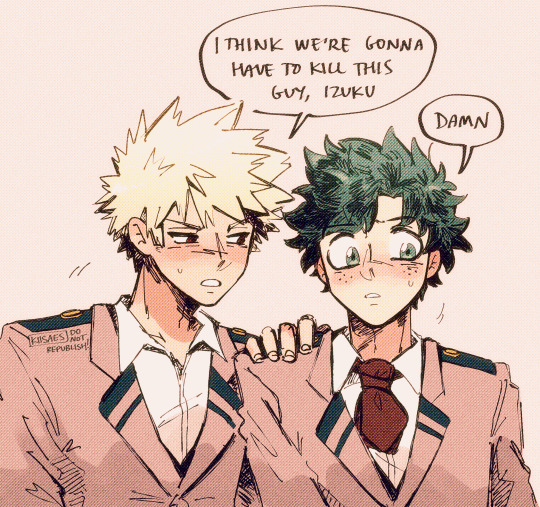
redraw of that one steven universe meme but as the "replace them with your comfort characters" art trend going around on twitter but mine are from the same series so the novelty is kinda gone and now it's just a bogstandard typical redraw. sorry
#i also contemplated switching their roles just so deku could say 'i think we're gonna have to kill this guy kacchan'#but it's less canon compliant and i'm a pussy#also this drawing made me realize just how little i've drawn bkdk in the last few months. their designs are brand new territory again wtf#bnha#mha#bakugou katsuki#midoriya izuku#bakudeku#bkdk#redraw#shitpost#fan art#becki draws stuff n stuff#I FUCKED UP THE HAND. WHY DID I HAVE TO NOTICE THIS AFTER POSTING IT. WHAT THE FUCK
2K notes
·
View notes
Text
The Batkids find an abandoned baby during patrol and have no idea what to do with it so they decide to keep it secretly overnight at the Manor. They play it completely cool but then realize that babies cry and they have no food or idea what to do. While Alfred runs out to get the necessary supplies, Bruce (who is highly convinced he's losing his mind) finds said baby and manages to get it to calm down.
#I think it's adorable personally#Contemplating if I have the time to write this#so here's the bare bones of a fic I'm trying not to work on due to a criminal number of WIPs:#batman#dc comics#bruce wayne#batfamily#personal#I'm deciding still between a sad adjacent ending and a fluffy unrealistic one#Will take feedback on that
588 notes
·
View notes
Text
I've seen that "the immortal loses their loved one but not their loved one's family; what if the immortal stayed close, followed them down the generations?" post a dozen times, and I understand it's intended to be sweet---but every single time I see it, all I can think is that it's straight-up the beginning of a horror story.
#''what if your grandfather never aged or died just stayed there forever demanding an appreciative audience'' and other stories#that turn my blood to ice just to contemplate.#king lear but he's immortal. he will not just hover over regan and goneril he will loom over their children.#and their children's children. and cordelia's children when they slink back because three generations in and he owns a country now.#wait a few more generations and everyone is related to him somehow. he is all but a god.#......I think this is going to be my contribution to the internet going forward.#make an adorable post and I will pull a horror story out of it.#that adorable post about how plausibly you could introduce same-sex arranged marriages to a historical au?#actually it's a horror story about family control and property rights.#oh that's so sweet look an immortal love story - nope. also about family control and property rights.#what about - yeah still control. and property rights.#............................I'm having a great day why do you ask.#for my own purposes
340 notes
·
View notes
Text


Transformers ships become infinitely more enjoyable when you consider The Polycules. This happened in tfone I was there
#i have been contemplating not posting tf art here anymore but this did numbers on twitter so I'm testing the waters#moths art#transformers#decepticule#starwaves#← it's both of these. teehee#megatron#shockwave#starscream#soundwave
310 notes
·
View notes
Text
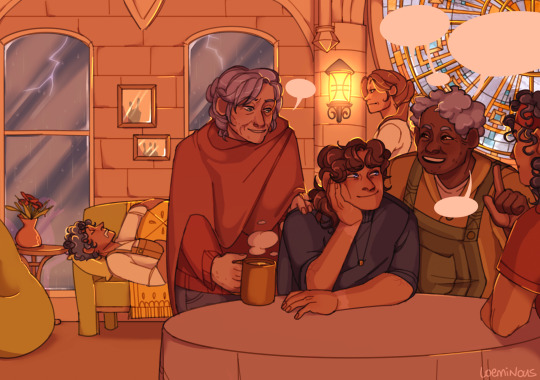
TOApril Day 28 – Silent Thunder
Last prompt for this year!! Waystation gang to the rescue ✊
#him going there first after something bad happens with zeus is canon in my heart#whether the others know or not about why he's there is up to your personal interpretation <3#i'm sure if she knew josephine would def contemplate 'silencing thunder' physically#trials of apollo#percy jackson#toa#pjo#apollo#lester papadopoulos#leo valdez#calypso#lityerses#emmie and jo#toapril#toapril 2024#scribbles#lonely thoughts
939 notes
·
View notes